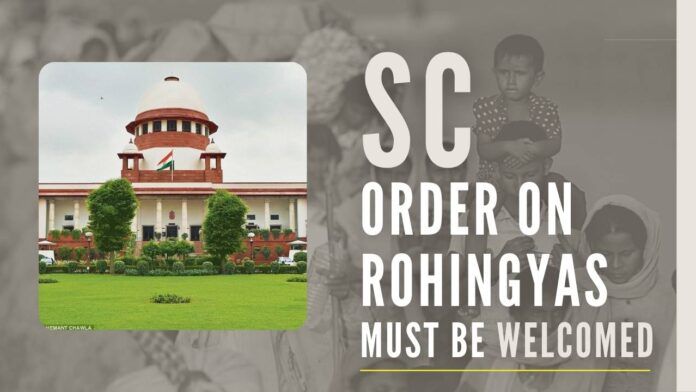
The SC delivered a very meaningful order on the illegal aliens
April 8, 2021, would go down in the political history of under-threat India as an eventful day. That day, the CJI (Chief Justice of India) S A Bobde-headed two-judge Bench disposed off the writ petition filed by Jammu-based illegal immigrant, Rohingya activist Mohammad Salimullah. He had filed the petition through Prashant Bhushan, who once advocated J&K’s independence from India and was thrashed by some outraged young nationalists in his Delhi office, and Colin Gonsalves. The SC (Supreme Court) delivered a very meaningful order on the illegal aliens — over 170 Rohingyas — who were put under detention at Jammu’s Hiranagar sub-jail last month after verification by the security agencies, including J&K police.
The petitioners had sought: (i) “the release of the detained Rohingya refugees; and (ii) a direction to the Union of India to not deport the Rohingyas who have been detained in the sub-jail in Jammu”. The petitioners’ counsels had put forth three main arguments while urging the SC to order the release of the detained Rohingyas and bar the Union Government from deporting them to Myanmar. One was that “the principle of nonrefoulement is part of the right guaranteed under Article 21 of the Constitution”. The other was that “the rights guaranteed under Articles 14 and 21 are available even to non-citizens”. And, the third upshot of their spurious argument was that “though India is not a signatory to the UN Convention on the Status of Refugees 1951, it is a party to the Universal Declaration of Human Rights 1948, International Covenant on Civil and Political Rights 1966 and the Convention on the Rights of the Child 1992 and that therefore nonrefoulement is a binding obligation”.
Not just this, the SC Bench also upheld the view of the Union Government that the decision of the International Court of Justice has no relevance to the present application
It is heartening to note that the SC Bench rejected outright all the arguments advanced by the Rohingyas’ counsels. Instead, it appreciated and upheld the arguments advanced by the Government of India through Solicitor General Tushar Mehta. The arguments advanced by the Government of India in the apex court read like this:
- That similar application in I.A. No.142725 of 2018 challenging the deportation of Rohingyas from the State of Assam was dismissed by this Court on 4.10.2018.
- That the persons for whose protection against deportation, the present application has been filed are foreigners within the meaning of Section 2(a) of the Foreigners Act, 1946.
- That India is not a signatory either to the UN Convention on the Status of Refugees 1951 or to the protocol of the year 1967.
- That the principle of nonrefoulement is applicable only to ‘contracting states’.
- That since India has open/ porous land borders with many countries, there is a continuous threat of an influx of illegal immigrants.
- That such influx has posed serious national security ramifications.
- That there is organized and a well-orchestrated influx of illegal immigrants through various agents and touts for monetary considerations.
- That Section 3 of the Foreigners Act empowers the Central Government to issue orders for prohibiting, regulating or restricting the entries of foreigners into India or their departure therefrom.
- That though the rights guaranteed under Articles 14 and 21 may be available to non-citizens, the fundamental right to reside and settle in this country guaranteed under Article 19(1)(e) is available only to the citizens.
- That the right of the government to expel a foreigner is unlimited and absolute.
- That intelligence agencies have raised serious concerns about the threat to the internal security of the country.
Not just this, the SC Bench also upheld the view of the Union Government that “the decision of the International Court of Justice has no relevance to the present application”. In addition, the SC Bench refused to hear Chandra Udey Singh representing the “Special Rapporteur appointed by the UN Human Rights Council”, when leading luminary Harish Salve raised serious objections to his intervention. Salve represented the Union Territory of J&K in SC. It would not be out of place to mention here that two leading advocates, Vikas Singh and Mahesh Jethmalani, also appeared before the SC Bench for persons who sought to implead/ intervene in the matter.
Earlier on March 26, Tushar Mehta had countered Prashant Bhushan in the SC and said that “India is not the ‘immigrant capital’ of the world”, that “the continued stay of illegal immigrants would cause a threat to national security”, and that “their continued presence in Jammu also enabled them to get documents, including voter-ID cards, ration cards, Aadhaar cards and passports”.
It would only be in order if the relevant portions from the operative part of the SC order are quoted here verbatim. Such an approach will help put things in perspective. The relevant portions of the operative part read like this: “We have carefully considered the rival contentions…The National courts can draw inspiration from International Conventions/ Treaties, so long as they are not in conflict with the municipal law…we cannot comment upon something happening in another country (in this case Myanmar). It is true that the rights guaranteed under Articles 14 and 21 are available to all persons who may or may not be citizens. But the right not to be deported is ancillary or concomitant to the right to reside or settle in any part of the territory of India guaranteed under Article 19(1)(e)…Two serious allegations have been made in reply to the Union of India. They relate to the threat to the internal security of the country and the agents and touts providing a safe passage into India for illegal immigrants due to the porous nature of the landed borders…Moreover, this Court has already dismissed I.A.No.142725 of 2018 filed for similar relief, in respect of those detained in Assam. Therefore, it is not possible to grant the interim relief prayed for. However, it is made clear that the Rohingyas in Jammu, on whose behalf the present application is filed, shall not be deported unless the procedure for such deportation is followed”. Indeed, the apex court’s order paved way for their deportation back to Myanmar.
The manner in which the Union Government and Government of UT of J&K presented their cases in the apex court does suggest that they mean business. Now that the SC has in an unambiguous language gone by the stands taken by both the governments, it is hoped that the Indian Foreign Office and Union Home Ministry will invoke the Foreigners Act sooner than later and deport the illegal immigrants back to Myanmar and Bangladesh for the sake of internal security and national sovereignty.
Note:
1. The views expressed here are those of the author and do not necessarily represent or reflect the views of PGurus.










